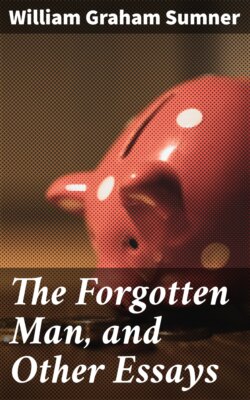The Forgotten Man, and Other Essays

Реклама. ООО «ЛитРес», ИНН: 7719571260.
Оглавление
William Graham Sumner. The Forgotten Man, and Other Essays
The Forgotten Man, and Other Essays
Table of Contents
PREFACE
PROTECTIONISM. THE -ISM WHICH TEACHES THAT WASTE MAKES WEALTH [1885]
PREFACE
Chapter I. DEFINITIONS: STATEMENT OF THE QUESTION TO BE INVESTIGATED
(A) The System of which Protection is a Survival
(B) Old and New Conceptions of the State
(C) Definition of Protectionism—Definition of “Theory.”
(D) Definition of Free Trade and of a Protective Duty
(E) Protectionism Raises a Purely Domestic Controversy
(F) “A Protective Duty is not a Tax.”
Chapter II. PROTECTIONISM EXAMINED ON ITS OWN GROUNDS
(A) Assumptions in Protectionism
(B) Necessary Conditions of Successful Protective Legislation
(C) Examination of the Means Proposed, viz., Taxes
(D) Examination of the Plan of Mutual Taxation
(E) Examination of the Proposal to “Create an Industry.”
(F) Examination of the Proposal to Develop our Natural Resources
(G) Examination of the Proposal to Raise Wages
(I) Examination of the Proposal to raise the Standard of Public Comfort
Chapter III. PROTECTIONISM EXAMINED ADVERSELY
1. PROTECTIONISM INCLUDES AND NECESSARILY CARRIES WITH IT HOSTILITY TO TRADE OR, AT LEAST, SUSPICION AGAINST TRADE (A) Rules for Knowing when it is Safe to Trade
(B) Economic Units not National Units
2. PROTECTIONISM IS AT WAR WITH IMPROVEMENT
(A) Taxes to Offset Cheapened Transportation
(B) Sugar Bounties
(C) Forced Foreign Relations to Regulate Improvement which can no Longer be Defeated
3. PROTECTION LOWERS WAGES
(A) No True Wages Class in the United States
(B) How Taxes Do Act on Wages
(C) Perils of Statistics, Especially of Wages
4. PROTECTIONISM IS SOCIALISM
Chapter IV. SUNDRY FALLACIES OF PROTECTIONISM
(A) That Infant Industries can be Nourished up to Independence and that they then Become Productive
(B) That Protective Taxes do not Raise Prices but Lower Prices
(C) That we should be a Purely Agricultural Nation under Free Trade
(E) That it is an Object to Diversify Industry, and that Nations which have Various Industries are Stronger than Others which have not Various Industries
(F) That Manufactures Give Value to Land
(G) That the Farmer, if he Pays Taxes to Bring into Existence a Factory, which would not otherwise Exist, will Win more than the Taxes by Selling Farm Produce to the Artisans
(H) That Farmers Gain by Protection, because it Draws so many Laborers out of Competition with them
(I) That our Industries would Perish without Protection
(J) That it would be Wise to Call into Existence Various Industries, even at an Expense, if we could thus Offer Employment to all Kinds of Artisans, etc., who might Come to us
(K) That we Want to be Complete in ourselves and Sufficient to ourselves, and Independent, as a Nation, which State of Things will be Produced by Protection
(L) That Protective Taxes are Necessary to Prevent a Foreign Monopoly from Getting Control of our Market
(M) That Free Trade is Good in Theory but Impossible in Practice; that it would be a Good Thing if All Nations would have it
(N) That Trade is WAR, so that Free Trade Methods are Unfit for it, and that Protective Taxes are Suited to it
(O) That Protection Brings into Employment Labor and Capital which would otherwise be Idle
(P) That a Young Nation Needs Protection and will Suffer some Disadvantage in Free Exchange with an Old One
(Q) That we Need Protection to Get Ready for War
(R) That Protectionism Produces some Great Moral Advantages
(S) That a “Worker may Gain More by Having his Industry Protected than he will Lose by Having to Pay Dearly for what he Consumes. A System which Raises Prices all round—like that in the United States at present—is Oppressive to Consumers, but is Most Disadvantageous to those who Consume without Producing anything, and Does Little, if Any, Injury to those who Produce More than they Consume.”
(T) That “A Duty may at once Protect the Native Manufacturer Adequately, and Recoup the Country for the Expense of Protecting him.”
Chapter V. SUMMARY AND CONCLUSION
TARIFF REFORM32
WHAT IS FREE TRADE?33
PROTECTIONISM TWENTY YEARS AFTER34
PROSPERITY STRANGLED BY GOLD35
CAUSE AND CURE OF HARD TIMES36
THE FREE-COINAGE SCHEME IS IMPRACTICABLE AT EVERY POINT37
The Program
Free Silver Means Fiat Paper Money
Limit of the Amount of Silver which could be Absorbed
It is Impossible Indefinitely to Increase the Circulation
Antagonistic Interests of Miners and Populists
The Rise of Prices
Where the Expected Gains would Go
Playing into the Hands of the Money Sharks
THE DELUSION OF THE DEBTORS38
The Re-monetization of Silver
Financial Institutions as Debtors
Small Mortgagors
Farmer-Mortgagors
Social War the Consequence
The Exploded Booms
THE CRIME OF 187340
Legislative History of the Act of 1873
Was it Passed Surreptitiously?
That the People Did Not Know of It
Motive of the Law
Alternate Ruin to Debtors and Creditors
Demonetization Removed No Money from Use
The Alleged Scramble for Gold
Proof that there has been no Scarcity of Gold
How to Get Poor and Rich at the Same Time
Monopoly of the Money
A CONCURRENT CIRCULATION OF GOLD AND SILVER [1878]
THE INFLUENCE OF COMMERCIAL CRISES ON OPINIONS ABOUT ECONOMIC DOCTRINES [1879]
THE PHILOSOPHY OF STRIKES41
STRIKES AND THE INDUSTRIAL ORGANIZATION42
TRUSTS AND TRADES-UNIONS43
AN OLD “TRUST”45
SHALL AMERICANS OWN SHIPS?47
POLITICS IN AMERICA, 1776–187648
THE ADMINISTRATION OF ANDREW JACKSON49 [1880]
THE COMMERCIAL CRISIS OF 1837 [1877–1878]
THE SCIENCE OF SOCIOLOGY58
INTEGRITY IN EDUCATION59
DISCIPLINE
THE COÖPERATIVE COMMONWEALTH. Note by the Editor
THE FORGOTTEN MAN [1883]
BIBLIOGRAPHY. BIBLIOGRAPHICAL NOTE
Footnote
INDEX
Отрывок из книги
William Graham Sumner
Published by Good Press, 2022
.....
How to Get Poor and Rich at the Same Time.
Monopoly of the Money.
.....